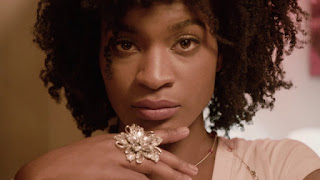 |
| Brown Girl Begins film poster. |
I never thought a day would come to see a heroine who looked like me, a family member, or a dear friend.
Yes, I had seen the fantastic trailer and drooled at beautiful visuals.
However, three minutes wasn't enough preparation for a splendidly grand feast.
For perhaps the first time, in Brown Girl Begins, with Ti-Jeanne, we witness compelling depth of black women complexity. Her dark brown skin, an embraced anomaly, screamed joyful sentiment. One didn’t need to have bi-racial genes to be a beautiful, fiery leader-- to be Hollywood's only version of black. Her giant, wiry curled hair, out and free or braided elegantly, tall, graceful curved figure was as powerful and strong as any typical long haired spry, tiny white vixen.
In most big budget post-apocalyptic science fictions, the world disposes brown and black people, leaving white to rule as they always have prior. To those filmmakers, it is as though in some strange sadistic way, colonialism has not only taken over and destroyed almost everything possessed throughout history, it survives the future whilst finding new area to thrive and conquer. The lead must be a white man or a white woman. Even though Book of Eli and I Am Legend showed black men as lone valiant protagonists, black women were invisible, unvoiced with the women (sidekick) roles filled by Alice Braga and Mila Kunis respectively.
Brown Girl Begins changes the narrative.
In the year 2049, left behind in the gruesome ghetto conditions, in dystopian Toronto, the fate of desecrated world rests with one girl, a girl with a fearful past that could possibly change the future. Clairvoyant Ti-Jeanne is a skilled natural healer and herbalist who knows every plant's medicinal properties and uses them to make concoctions against the brutal scars inflicting poor, desperate addicts.
In the year 2049, left behind in the gruesome ghetto conditions, in dystopian Toronto, the fate of desecrated world rests with one girl, a girl with a fearful past that could possibly change the future. Clairvoyant Ti-Jeanne is a skilled natural healer and herbalist who knows every plant's medicinal properties and uses them to make concoctions against the brutal scars inflicting poor, desperate addicts.
However, in order to become even greater, more powerful than ever, it is her destiny to allow Papa Legba to seep his ancient power inside of her own human body and take over.
Due to complicated memories of the past, she doesn't want this.
But alas, Ti-Jeanne listens to her heart. A beautiful montage happens between Ti-Jeanne and Tony: sharing tentative first kisses and brown eyed stares in woodsy abyss, collecting chopped tree branches, and stolen touches of budded love. When Ti-Jeanne and Tony come together, staying at his high towered place, dark brown skin meet over and around dark brown skin, colliding slowly, softly, passionately. These magical, tenderly placed scenes share divine love between these two characters. As it grows and deepens, the arousing, euphoric peace they blissfully experience becomes further tangled as outer threats become greater.
Still, black forbidden love, heartbreakingly poignant and sweetly sincere, is executed brilliantly.
 |
| Ti-Jeanne (Mouna Traoré) and Tony (Emmanuel Kabongo) have a bittersweet forbidden love story. |
Suddenly, this world of Ti-Jeanne's inner intimate circle feels contemporary, feels present.
It is adjacent to now-- the Flint water crisis, implanted drugs in poverty stricken neighborhoods, the white supremacists in Congress sabotaging health insurance...
 |
| Ti-Jeanne (Mouna Traoré) and mute Gracie (Hannah Chantée) have a tenderly portrayed relationship of dear sisters and close friends. |
Moreover, Mouna Traoré was an astounding fire starter, a gem to watch, playing each note of Ti-Jeanne's multi-faceted humanity. Her big doe eyes expressed love for her family, for friends, for her boyfriend, and for her community. To allow that love to transform into grief and sorrow as her balance falls apart, as that balance then manifests into fearlessness and strength, showed that this actress has phenomenal range. She had amazing chemistry with Emmanuel Kabongo, who too portrays a deeply layered character, a man wanting to be a good boyfriend while his honorable intentions are stripped away, peeling and peeling, putting him up to a test that is too difficult to pass.
 |
| Ti-Jeanne (Mouna Traoré) reigns supreme. |
Brown Girl Begins unveils profound beauty in a fragile, corruptive society, like an opening flower opening petals upon a barren, bleak landscape. Ti-Jeanne, a reluctant she-ro, is brave, smart, and gifted, restoring balance and hope, bringing prosperous healing to not only her shattered, devastated community, but to an audience who often imagined themselves at the cusp of such a story, but rarely saw fruition, unsown seeds plowed into earth. Well, what seemed like forever is now. It is finally arrived. This wondrously rendered art can be the catalyst to expanding conversations about black women heroes, especially in the science fiction realm.
Thanks to Hopkinson and Lewis, a black girl can see herself in the future saving the world.





















